Croatia Airlines Flights from Zagreb: 10 International Seasonal Lines Dropped
April 6, 2021 - The latest flight news for Croatia as there could be 10 fewer international Croatia Airlines flights from Zagreb this summer.
Croatian Aviation reports that the Croatian national airline will no longer sell 10 international routes on which the company operated from Zagreb in the summer of 2019, before the outbreak of the global pandemic.
These are international routes from Zagreb Airport that the airline has gradually introduced since the summer of 2016 and on which it operated seasonally in the summer flight schedule. Most of the lines were in operation from April to October, but certain lines started operations earlier, in March, and continued until December.
The airline will likely not resume traffic on as many as 10 international routes from Zagreb Airport in the upcoming summer flight schedule:
Barcelona,
Bucharest,
Lisbon,
Mostar,
Milan,
Prague,
Oslo,
Stockholm,
Helsinki,
St. Petersburg.
Vueling and TAP Portugal should operate on the routes from Barcelona and Lisbon, Ryanair will operate to Milan, and Zagreb Airport will not have direct flights to other destinations (Bucharest, Mostar, Prague, Oslo, Stockholm, Helsinki, and St. Petersburg).
Only flights from Zagreb to Dublin and Athens are on sale (with a stop in Dubrovnik). Still, the question is whether Croatia Airlines will withdraw the route to Dublin in the coming weeks, which the airline briefly introduced around the Easter holidays.
In the summer flight schedule, the Croatian national airline will continue to operate to several European destinations from Zagreb, mainly to major European hubs (such as Amsterdam, Paris, Frankfurt, London, etc.). Still, the question arises as to why the airline did not choose to operate on certain routes on which there is no competition, at least with a minimum of two flights a week in the peak season.
Follow the latest on flights to Croatia HERE and the latest travel updates and COVID-19 news from Croatia HERE.
For more on travel in Croatia, follow TCN's dedicated page.
Moving to Croatia to Live, an Englishman’s Perspective
April 6, 2021 - What's it like moving to Croatia? TCN contributor Dave Hall shares an Englishman's perspective.
I have been married to a Croatian lady for over 25 years. She came to the UK as an au-pair at the age of 19, where up till last year, she has spent most of her working life. During that time, we have returned to Croatia many times to visit family and have holidayed in different coastal resorts. We love the people, food, climate, and local culture and hoped that one day we would retire here.
The Covid-19 pandemic and Brexit pushed us to reflect on our future and last year we decided to sell our house and move to Croatia to live full time.
So, what has it been like living in Croatia?
Osijek, a hidden gem
Currently, we live in Osijek, where we have a small flat which we purchased some 10 years ago. Osijek is a lovely place to live, apart from the cold winters and mosquitoes in the summer which just love me. The people are friendly and easy to engage in conversation, even in English as my Croatian is not yet very good. My goodness, Croatian is such a difficult language to learn.
I love the way Osijek is still very family-centric and a safe place to live. There is a general feeling of friendliness, people always say hello, they smile and like nothing more than to talk, especially in the café bars.
Culturally, Slavonians have some lovely, if not quirky, things they love to do. They love to celebrate, whether it’s about sport, a saint’s day, the arrival of a baby, or getting married. Any excuse and they go for it. I have attended a few weddings here and, believe me when I say, it is an experience not to be missed. I hope to attend many more parties after the pandemic is over.
Osijek itself is a gem of a place. Very open, lots of green spaces and everything one would like in a town with a good theatre, cinemas, shopping and places to visit as a local and tourist. There are good schools and an excellent university.
The town has a Lido, which is in the process of being refurbished, and an indoor swimming pool and of course an excellent football team with a new stadium being built.
The riverside is a lovely place to take a stroll. There are lots of cycle lanes and provisions for dogs to run free off the lead. There is a definite emphasis on health, with most of the open spaces having facilities for children to play and adults to exercise.
The local council, considering their limited financial support from the Government, do their best to keep the town a clean and pleasant place to live. The open spaces are well kept, transport is clean and regular and with several recycling centres, getting rid of household rubbish is easy and free.
Since being a resident here, we have had several tradespeople in to do work. Starting early and normally finishing late in the afternoon, whatever the job, they were hard-working, knowledgeable and the workmanship was of good quality but finding the trades was extremely hard.
Osijek seems to be a forgotten town when it comes to investment. Taking a train to Zagreb takes longer now than it did when I first came here in 1993. There is an airport that could easily become a hub for the airlines, not to mention providing cheaper flights overseas instead of having to travel to Zagreb. And then, there is a River Danube that could become a major tourist destination and commercial port.
A new IT business park is currently being built but I have wondered why the likes of Amazon, Ikea, and other logistics companies have not set up here? The area is ideal for a logistics hub with plenty of labour, the motorway, an airport, the river port, and the space to build. I think a good opportunity is being missed.
A lot of investment in the town is happening, but I have a concern Osijek will become a beautiful place but without the investors in jobs it will end up with lots of empty buildings. They could consider making the County a free trade zone, a gateway to the EU.
It's all about the paper
One thing is for sure, living in Croatia means filling in many forms! Getting my OIB number, health insurance, driving licence, and registering my residency with the local police was not difficult but frustrating at times. Some local officials did not understand the rules even though the information was very clearly defined on the government website, that is until Article 75 came along and in my case, I had to re-apply using the same paperwork, the same photo, have my fingerprint retaken and pay again. Surely if the civil service had all they need to issue the first residency card then it surely would have taken less people's effort, time, and money to re-issue the electronic card with the information already held. We even had another visit from the Police to check we were genuine applicants!!!
I don’t know who was more embarrassed by their revisit, us or the police. I should say that our local officers who handled our case were excellent and very helpful.
Health services
We have found a good doctor, vet, and dentist who are all most competent with high standards.
The health service, which unfortunately I have had to use, I have found exceptionally good. OK, it’s not as streamlined as the NHS, for instance, I had to have four blood tests where one should have been sufficient, but it seems every department wanted their own test done and one has to get used to the paperwork! But the people were very helpful and as dedicated to giving the best care as any I have come across during my life.
During my stay in the hospital, I was made to feel very welcome and they went to great pains to make sure I understood the medical procedure and the treatment I was receiving. Even the food was acceptable albeit different from what I am used to. I have to say the beds were certainly more comfortable than in the UK.
The hospital in Osijek is old, but I am told work should start this year to build a new one.
Covid
Like the rest of the world, Croatia has had to contend with the issues and problems managing the Covid pandemic. Here in Osijek, most people have been sensible, following the guidelines and rules set by the county. In my opinion, they have done their best in difficult times. Part of the reason we came to Croatia when we did, was because we liked the way the county was handling Covid. We both thought it would be a safer place to be. Unfortunately, my wife and I have both had Covid and recovered without any major issues, thank goodness.
The EU as a whole has not been that great at getting enough of the Covid vaccine and it does appear that Osijek is not getting the fair share it needs to protect the local population when compared to other parts of the country. My doctor has a list of 300 vulnerable people including myself where the vaccine certainly would have saved a few lives and the heartache of losing someone. Yet, she only received 60 doses of vaccine so far.
Entrepreneurial mindset
What is very noticeable is how many young people have emigrated looking for work and better opportunities. Sad, but not unsurprising as finding a job here is very difficult and the remuneration is often below the government guidelines.
There is a clear need to create opportunities for young people to stay in Croatia and start businesses, but starting a business here is anything but easy. Although there are clearly a number of business opportunities in this beautiful country, what is lacking is the entrepreneurial mindset.
Starting a business here is a nightmare. By this I mean, the paperwork, the fees you have to pay not only to the government but to trade bodies, local chambers of commerce, people you don’t even understand why they should be involved and of course you must have lots of permits and certificates and a couple of spare trees and a filing cabinet for all the paper. All before you even started trading or making any money.
The government and banks really need a shove up the backside. Getting started in any business should be encouraged and supported by the financial sector and the Government. It seems to me that the opposite here very much applies. So much so, we are reconsidering starting a business.
Things are changing, but in my opinion slowly. All these antiquated rules and laws that stop people from taking the risk to start a business should I hope be a very high priority for not only the Government but the local officialdom who seem to have their own interpretation on how things must be done.
I was told people here are negative but, as far as my experience goes, I don’t think they are negative but many have given up trying to change things as it is so difficult. Bureaucracy is rife and much more depends on who you know and your position when trying to get things done. I am sorry to say, I have also come across some very incompetent people as well.
Future is digital, to a point
The broadband we have is very good, reliable and fast. In our case, we get 160mbs which is excellent.
But I cannot believe how bad most of the websites are and e-commerce is very underdeveloped. We are used to buying a lot of goods online, but here, not only finding what you want is difficult but most websites are not optimised for mobile. Goodness, that is not acceptable. It's not that Croatia does not have the skills and people to develop and manage an e-commerce website, it appears no one wants to invest in their online future.
Customers are looking to shop online but it isn't easy to find what you want at a good price. Sadly the answer has to be 'No'. It is the business mindset that needs changing. Businesses could sell much more if their websites were professional and usable. You try finding things using the search facility. Don’t bother, they don’t work, you are forced to find the link to open a catalogue and then spend hours looking for what you need. No wonder no one bothers. A good example of how to get it right is the parking app I use. I can park and pay anywhere in Croatia just by pressing a few buttons. Fantastic.
Could do better
Are there any downsides? Yes, of course, no country can claim to be perfect. I do understand Croatia has a small population and the government limited resources but I think they should re-look at the economic model. There is too much reliance on tourism. Supporting business start-ups, foreign inward investment, and effective regulations should be the focus post-Covid. Croatia is famous for its beautiful food and wine but only exports to a very limited market when there is scope to do more and better.
There is a definite lack of serious competition between supermarkets. All seem to have high prices and special offers. Perhaps they should offer lower prices and compete on the quality of the products and service rather than their special prices. The supermarkets and larger outlets must be laughing all the way to the bank. Osijek County (Slavonia and Baranja) has acres of fertile land so why is it you can’t buy local good quality produce except in Lidl and the markets.
It is expensive here. Food, electricals, services, etc are all VAT rated and at 25% is high by the world's standards and for local earnings. Cars are very expensive with import duties unrealistic compared to what people here can earn. It appears most loans have to be over a very long period to buy what is considered “luxury” goods.
Don’t even start me on estate agents and their deplorable marketing with huge fees, especially on the coast. Are some breaking the law by charging the seller and buyer and in some cases even asking for the buyer to sign a contract and charging to arrange a viewing? Looking on the government website, to be an estate agent, it is very clear what they should be doing in the way of contracts, marketing, and setting a fee for their service.
For me personally, the hardest thing about living in Croatia is the language. It is very hard to learn and speak as it's totally different from my native English. Despite that, I love it here. We are making friends, enjoying the café culture and even our dog has relaxed into the Croatian doggy lifestyle. In fact, he has more friends to play with than we do. Was it a good decision to move? Yes, very much so but like anyone who lives abroad, I do miss being able to see family and friends. Although covid has stopped that happening. Things can only get better.
For more about lifestyle in Croatia, follow TCN's dedicated page.
Learn more about living in Croatia HERE.
Opatija Camellias: A Symbol of Opatija on Display (PHOTOS)
April 6, 2021 - There is no doubt that Opatija is synonymous with Croatian tourism quality. But this beautiful Adriatic city has drawn many tourists and occasional travelers from around the world for another reason - Opatija camellias!
Just like in the past, today, the people of Opatija treat this beautiful, odorless flower with due respect, which adorns their parks and gardens with its charm in winter, early spring, and autumn again. Maybe they are shaded, maybe red or yellow or white, but each of these delicate flowers always elicits a smile of beauty, admiration, and that well-known feeling of love.
Frenchwoman Marie Duplessis, the real love of Dumas, in whose memory he wrote The Girl Who Loved Camellias (embodied in the romantic drama of the same name as Marguerite Gautier and played by the inimitable Greta Garbo), told fans to bring her camellias because she likes candied grapes because they have no taste, and camellias because they have no smell.
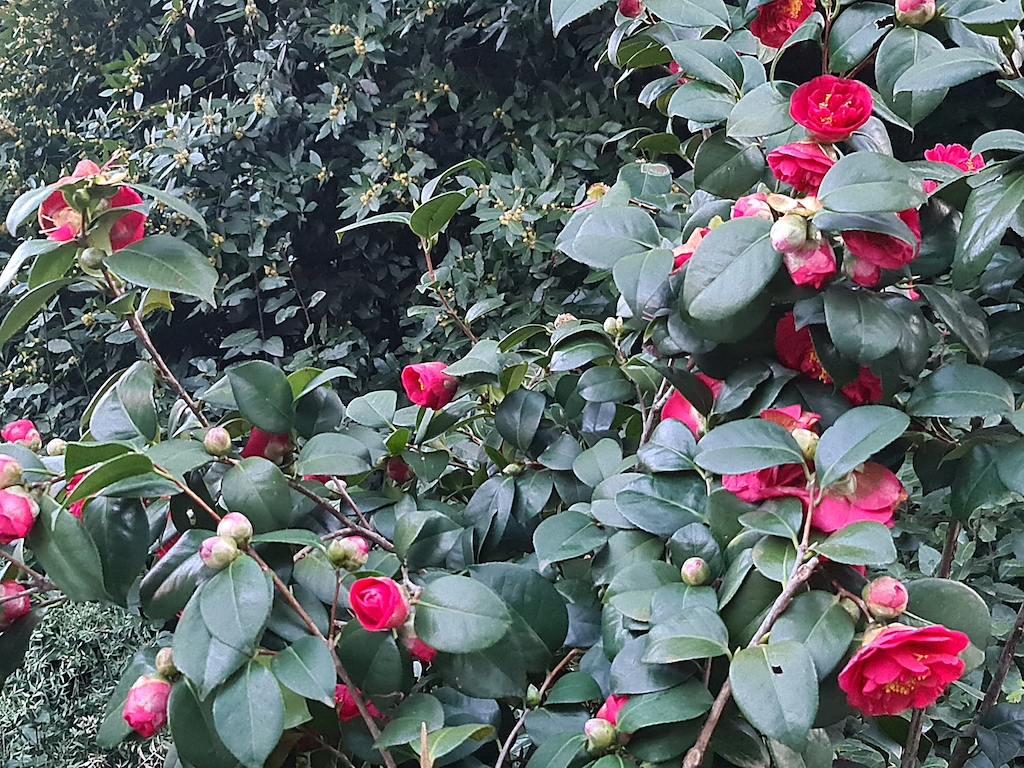
Slobodan Kadic
Opatija camellias exude fashion and are a recognizable brand of the city, to which fashion is another name. And if you think that's the end of the story, then you're wrong!
The Association of Camellia Lovers from Opatija successfully organized the annual exhibition "Camellia 2021." Thus, visitors to the Šporer Gallery could admire the symbol of Opatija and infinite love for three days and also choose their most beautiful flower out of a hundred that arrived.
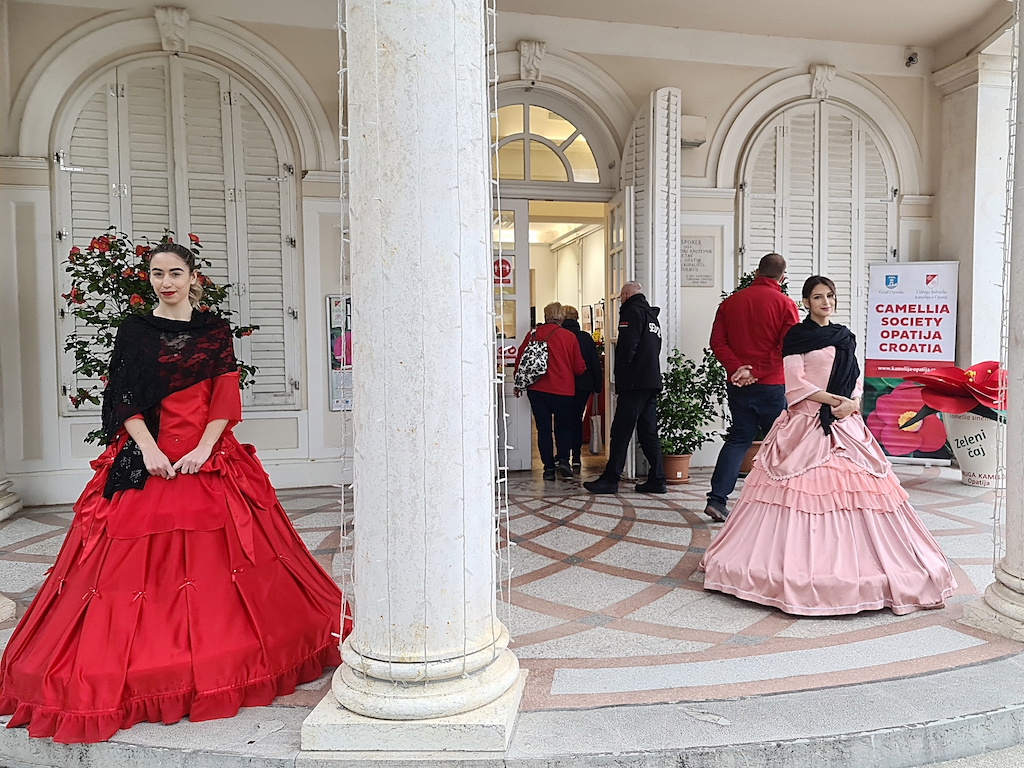
Slobodan Kadic
"Everyone had the opportunity to see this symphony of fresh flowers, photographs, but also children's works by kindergarteners and elementary school students on the topic of camellias. Members of the Association presented their unique souvenirs, and we rewarded the owners of the most beautiful flowers and shrubs that were previously inspected and photographed," says the charming Mira Shalabi, the new president of the Association of Camellia Lovers.
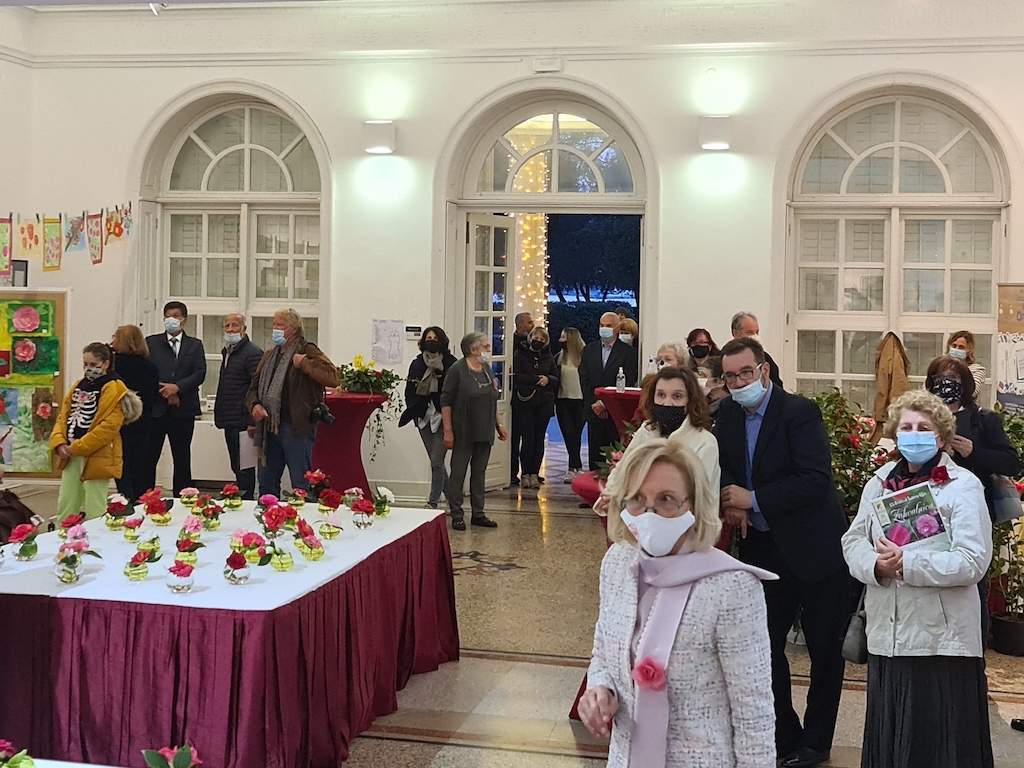
Slobodan Kadic
The opening of the exhibition was an evening to remember. Gabrijela Deglin, singer of the Croatian National Theater Rijeka, accompanied by pianist Vladimir Babin, performed an aria from the opera La Traviata, "Addio del Passato," and Laura Valenčić from the Ivan Matetić Ronjgov Music School, accompanied by her father Aleksandar Valenčić, Ivanka Klovar, a member of the Rijeka Writers' Association, and Dorian Rubeš, also from the Music School, presented themselves.
Sofia Šmitran from Rijeka, Ingeborg Prasnikar from Poljane (Opatija) and Antonija Cvetković from Rijeka were chosen for the most beautiful camellia flowers. Sofija Šmitran from Rijeka (first and third place) and Nikola Turina from Opatija (second place) were also chosen for the most beautiful camellia bush. Several hundred visitors chose the camellia of Čedna Hotzi Raffanelli from Opatija as the most beautiful flower, second place to Marija Benko from Mošćenička Draga, and the third place was shared by Mirjana Mendrila from Kastav and Dolores Miletić from Rijeka.
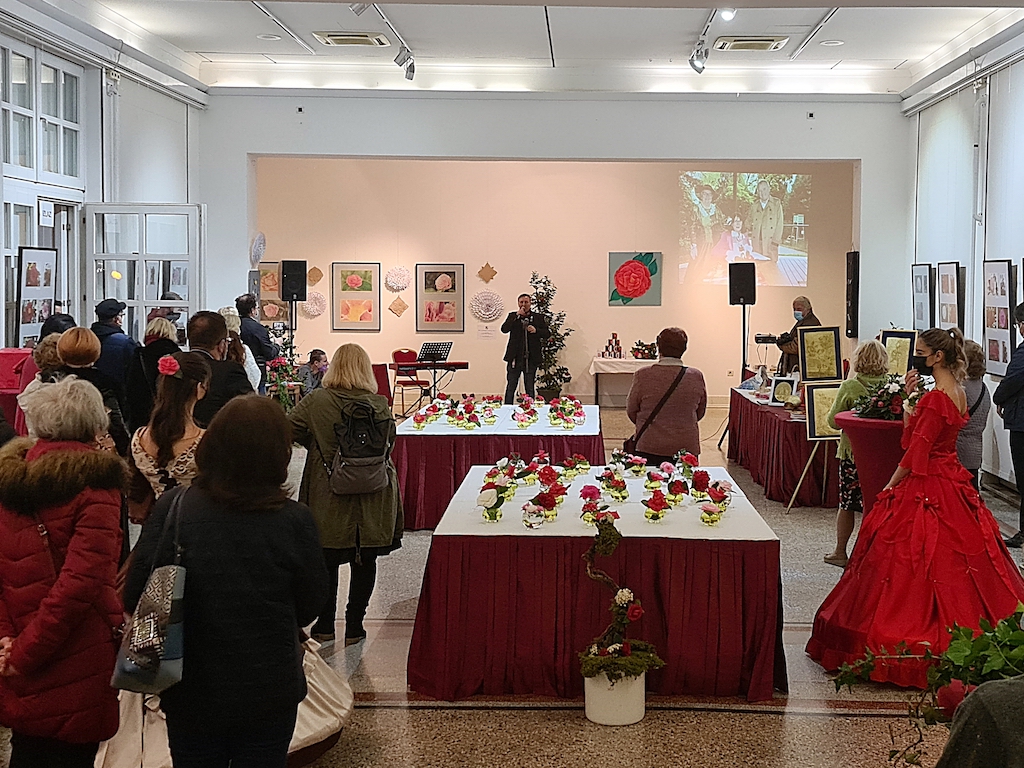
Slobodan Kadic
"And the prizes were again camellias. You know, the camellia does not thrive everywhere, and Opatija is extremely suitable for it due to its humid climate, with shady places under the trees, possibly the northern part, and necessarily acidic soil. About a hundred flowers were reported, and each was different. They were all from private gardens," Shalabi continues, emphasizing that especially gorgeous camellias in Opatija can be seen in the Angiolina Park, a real carousel of different colors in one place.
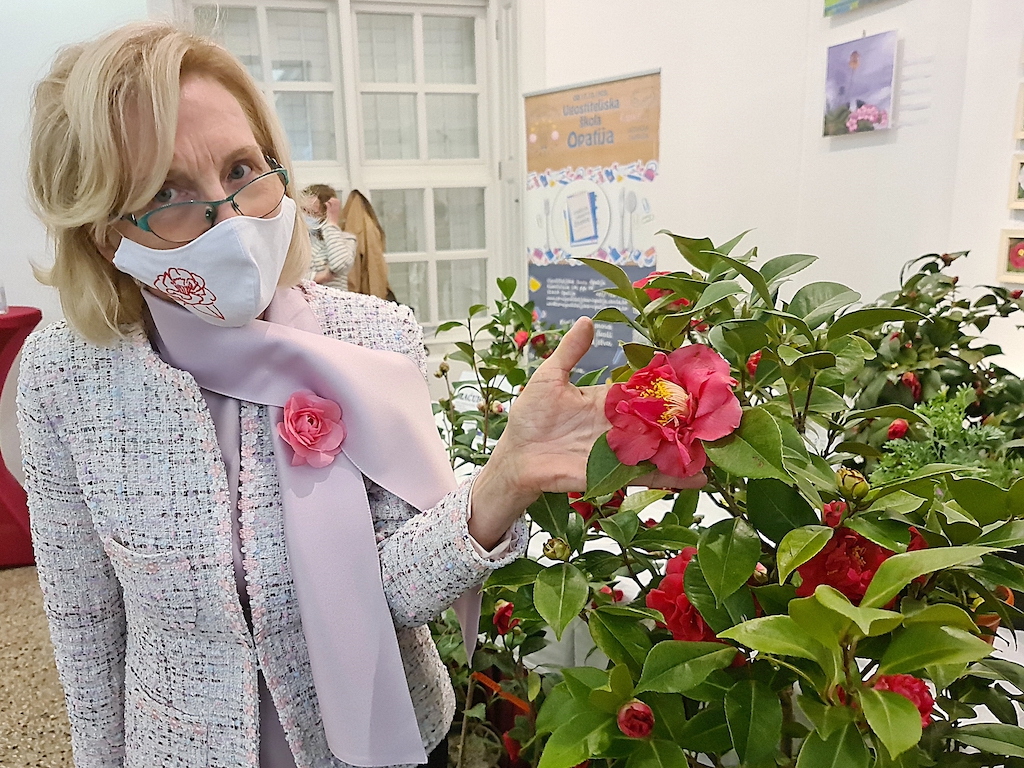
Slobodan Kadic
The Camellia Lovers Association has been active since 2008 and has 140 members. Their goal was to promote their Opatija as a city of camellias.
"We were helped by the City of Opatija, but also by the Tourist Board of Opatija, with which we have excellent cooperation. The biggest stress in the exhibition's preparation was the epidemiological measures that we adhered to in detail, and we did not know until the end whether we would be able to hold the exhibition at all!"
They are especially proud of joining the International Camellia Society. Croatia recently and officially became the 16th region at the 2018 International Camellia Congress in Nantes. Wild species of camellias are most widespread in the countries of East and Southeast Asia but are grown in many countries. Thanks to the beautiful shapes of the tree, colorful and magnificent flowers, and bright evergreen leaves, the camellia is adored by flower lovers and appreciated by gardeners worldwide.
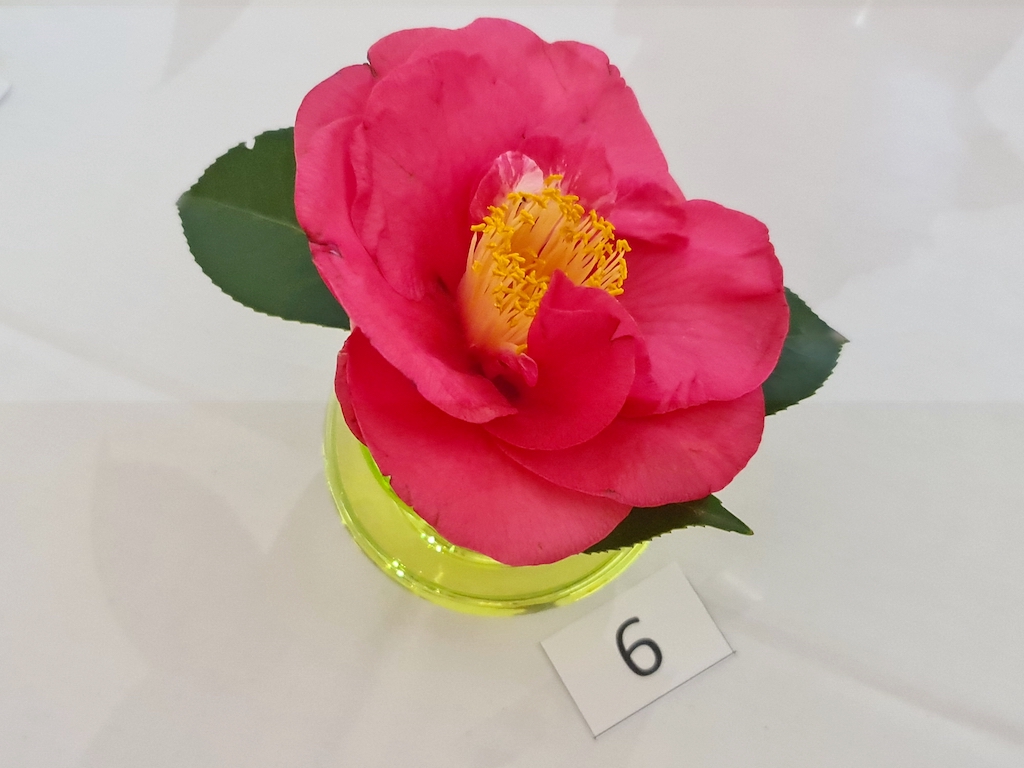
Slobodan Kadic
"The cultivation of the first camellia in Opatija can be traced back to 1845. In the meantime, the camellia has become a favorite ornamental flower and garden plant in Croatia. Let camellias bloom in Croatia! Let the people in Croatia be happy!" said Guan Kaiyun, President of the International Camellia Association.
Members of the Opatija Association of Camellia Lovers do not rest. They are already planning to plant five large camellias around the Faculty of Tourism Management in Opatija and organize a school in nature for elementary school students.
"I hope that we will achieve that, and in November when those autumn/winter camellias bloom, we would also like to organize a camellia planting event with a musical event that would enrich the act of planting," concluded Shalabi, inviting all readers to come to Opatija and enjoy its flowers of life!
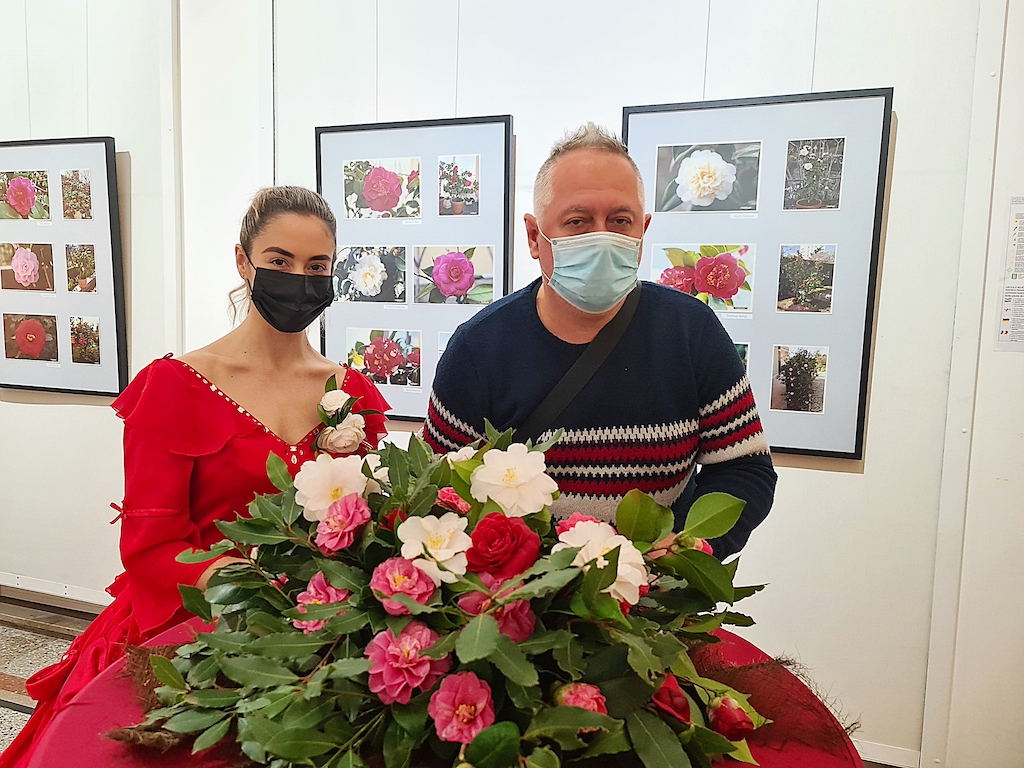
Slobodan Kadic
The first camellia of the Camellia japonica variety with the prefix Rubra simplex was delivered to Opatija by the renowned Trieste-Rijeka merchant Iginio Scarpa. His brother-in-law Giovani Guglielmo Sartorio helped him transport from the royal park in Pillnitz near Dresden back in 1845. Scarpa wanted to plant a camellia in the park next to his villa as a symbol of love and memory of his prematurely deceased wife, Angiolina.
To read more about travel, follow TCN's dedicated page.
ATP Challenger Split Open: Round One Results
April 6, 2021 - Bernard Tomić, the main star of the ATP Challenger Split Open, was eliminated in the first round by seventh-seed Kimmer Coppejans of Belgium 6:2, 4:6, 6:3.
In the two-hour match, the Australian and former member of the Top 20 had an early "break" at the start of the third set. He saved as many as nine breaks in that set, but Coppejans, the junior winner of Roland Garros in 2012, took away Tomić's service for the 5:3 lead, followed by 0-40 on the way to the victory. In the next round, Coppejans goes against another Australian, Aleksandar Vukić, who eliminated Croatian Mili Poljičk.
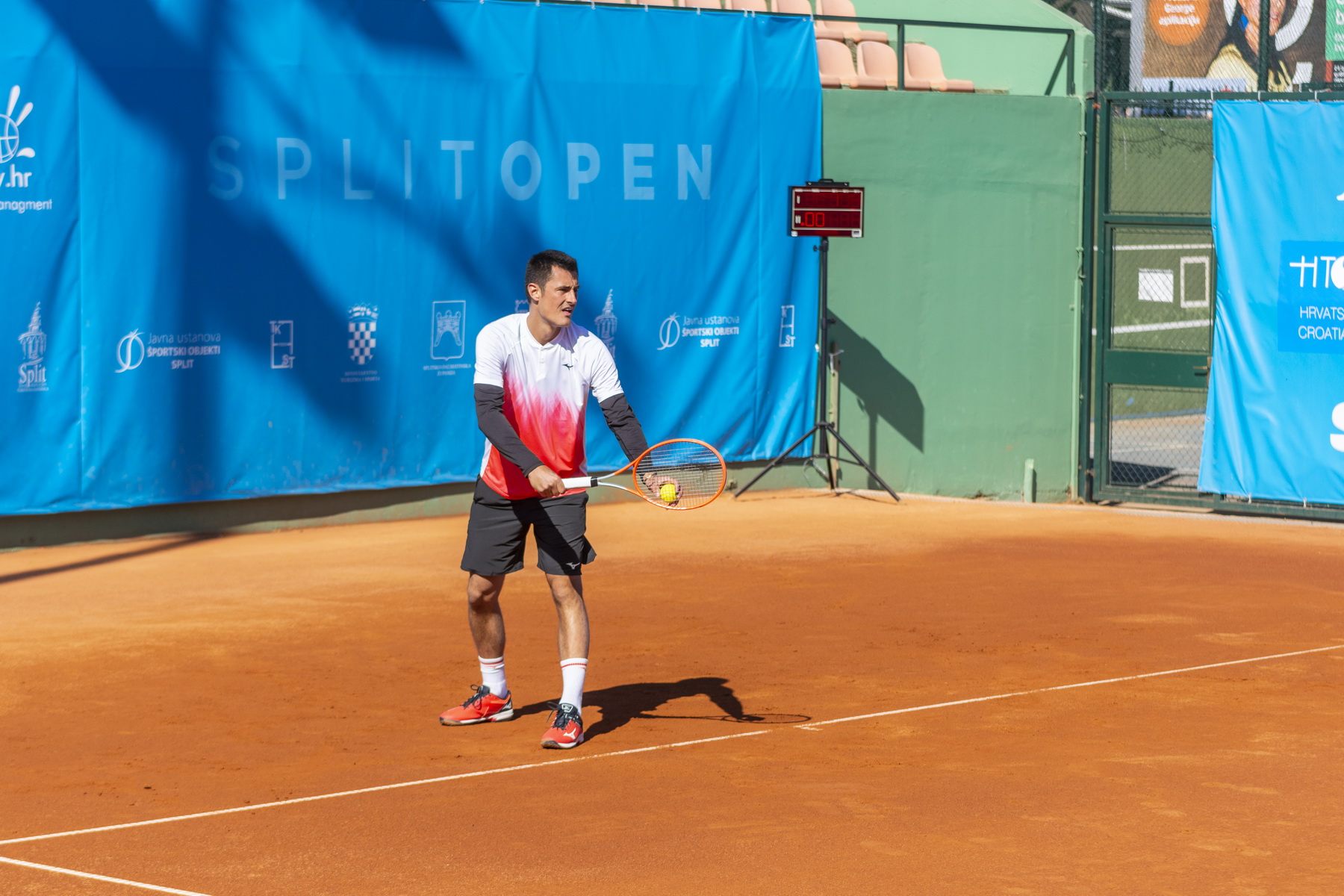
Robert Pleško
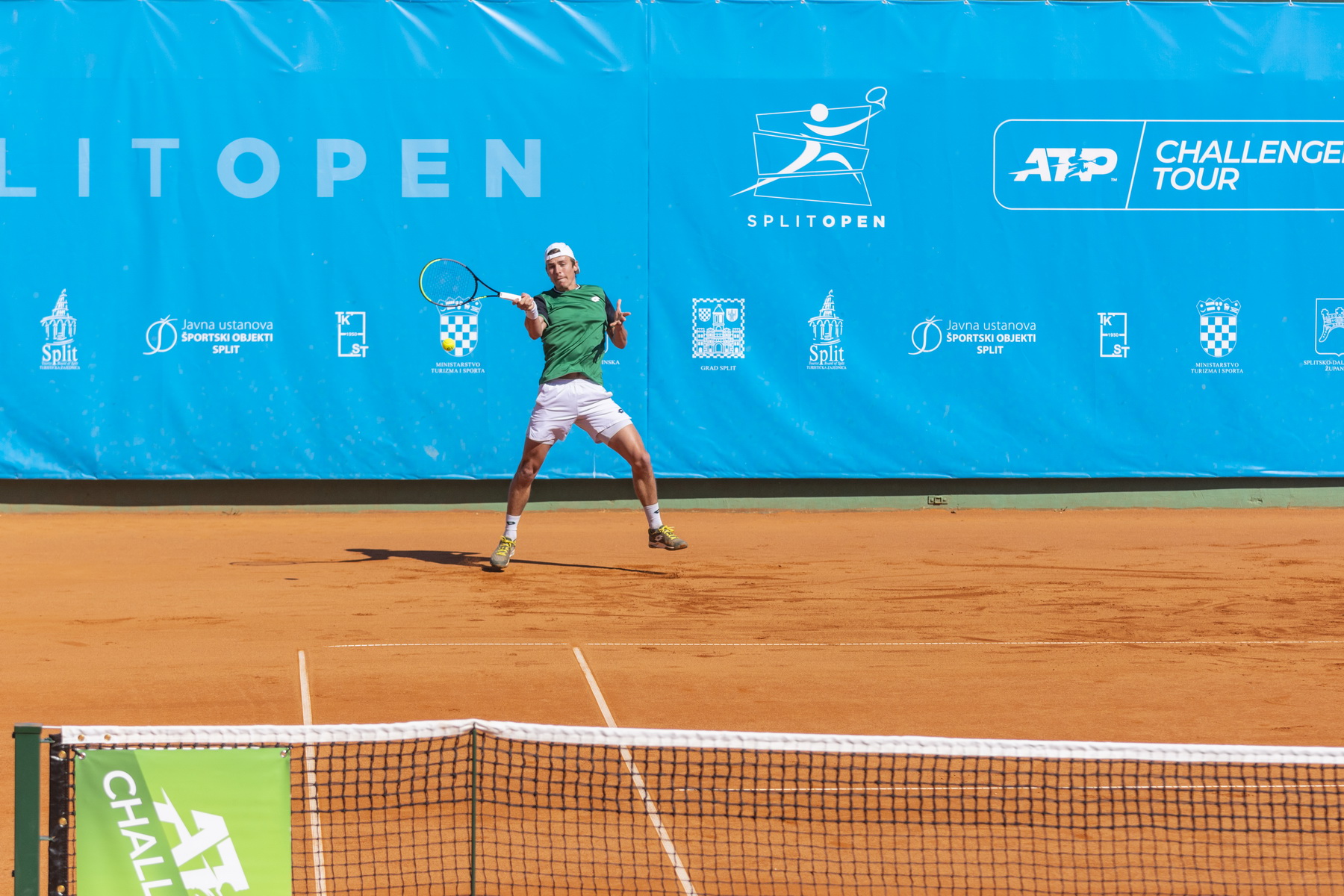
Robert Pleško
The third seed, Austrian Sebastian Ofner, lost to Argentine Andrea Collarini 6:4, 6:4, the fifth seed Danilo Petrović from Serbia easily defeated the Czech veteran Lukas Rosol 6:1, 6:3, registering his first victory this year, and the sixth seed Blaž Rola from Slovenia was successful against Kazakhstan's Dmitrij Popko (6:3, 6:4).
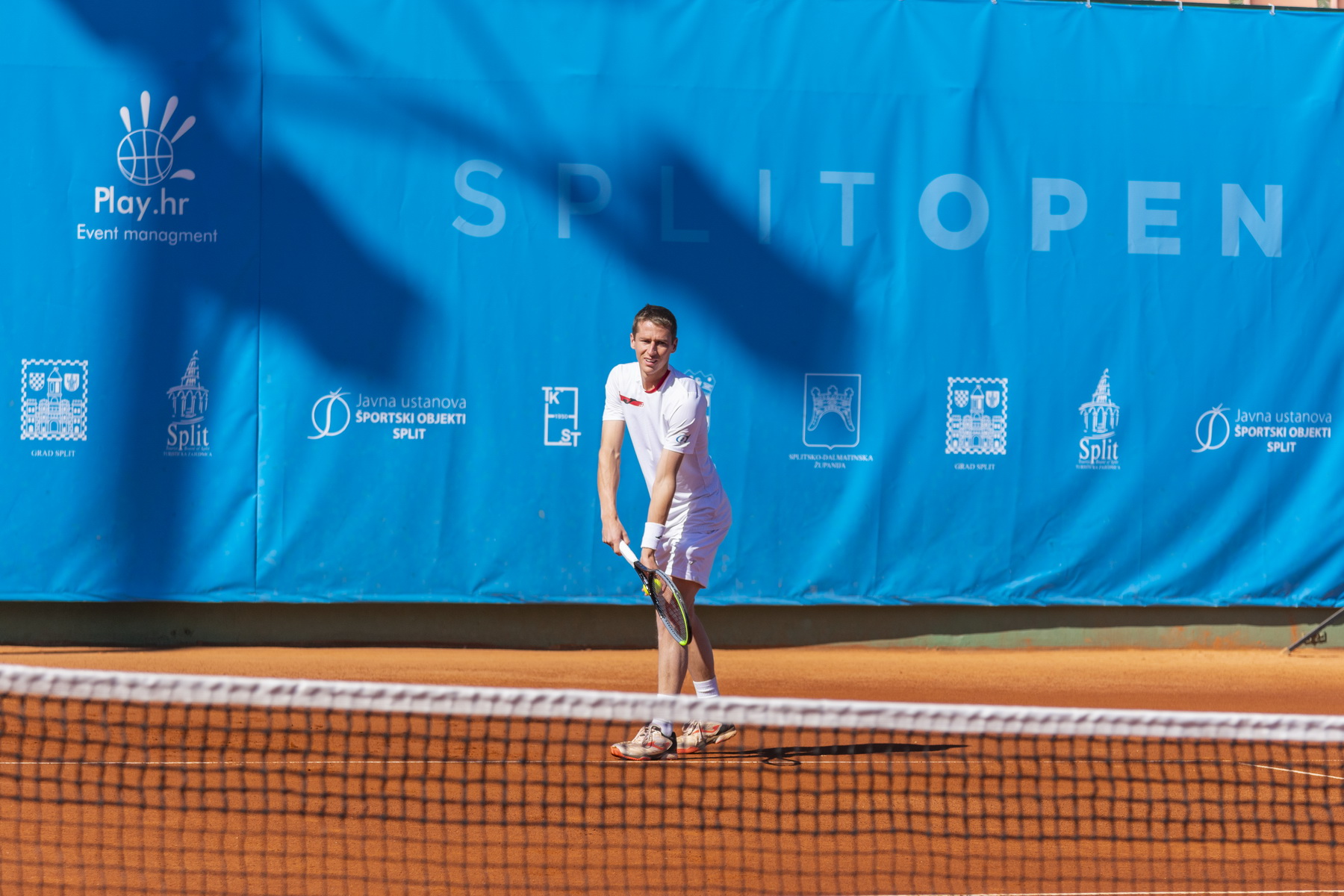
Robert Pleško
Last year's Split Open quarterfinalist Maximilian Marterer from Germany and Swede Elias Ymer also qualified for the second round, and Blaž Kavčič, Uladzimir Ignatik, Akira Santillan, and Mirza Bašić secured a place in the main tournament through the qualifications.
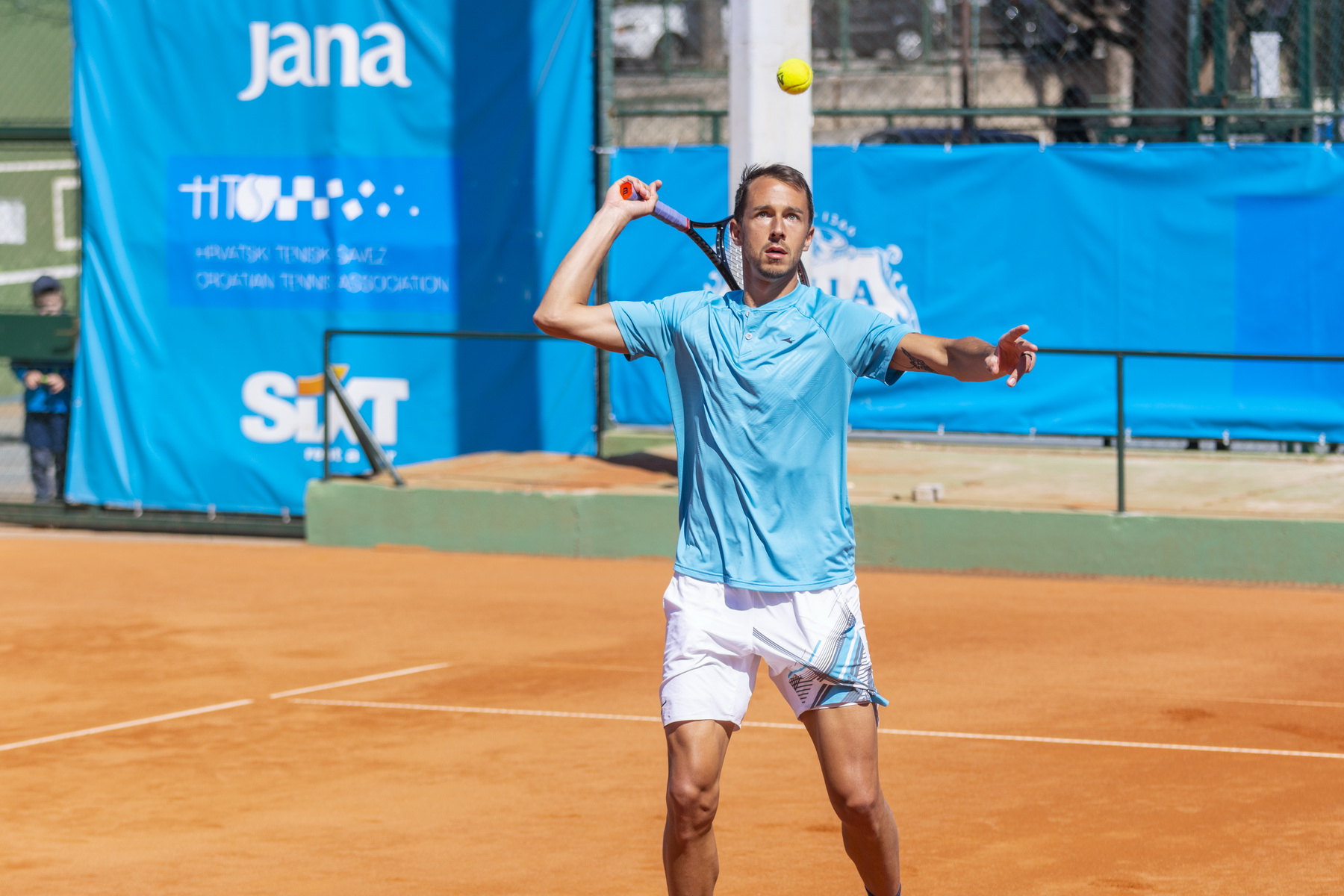
Robert Pleško
Tuesday should be a rich day in Firule, although Split's weather forecast is not very favorable, especially in the latter part of the day. The program on the Central Court at 10:30 am will be opened by Duje Ajduković and Dustin Brown, the third match at 10:30 am on Court 3 will be played by Nino Serdarušić and Jay Clarke, and the doubles tournament will start, with three Croatian pairs in action (Krolo / Mikrut, Kekez / Poljičak and the Sabanov brothers). Last year's finalist and first-seed Pedro Sousa will also play, followed by Robin Haase and Thanasi Kokkinakis.
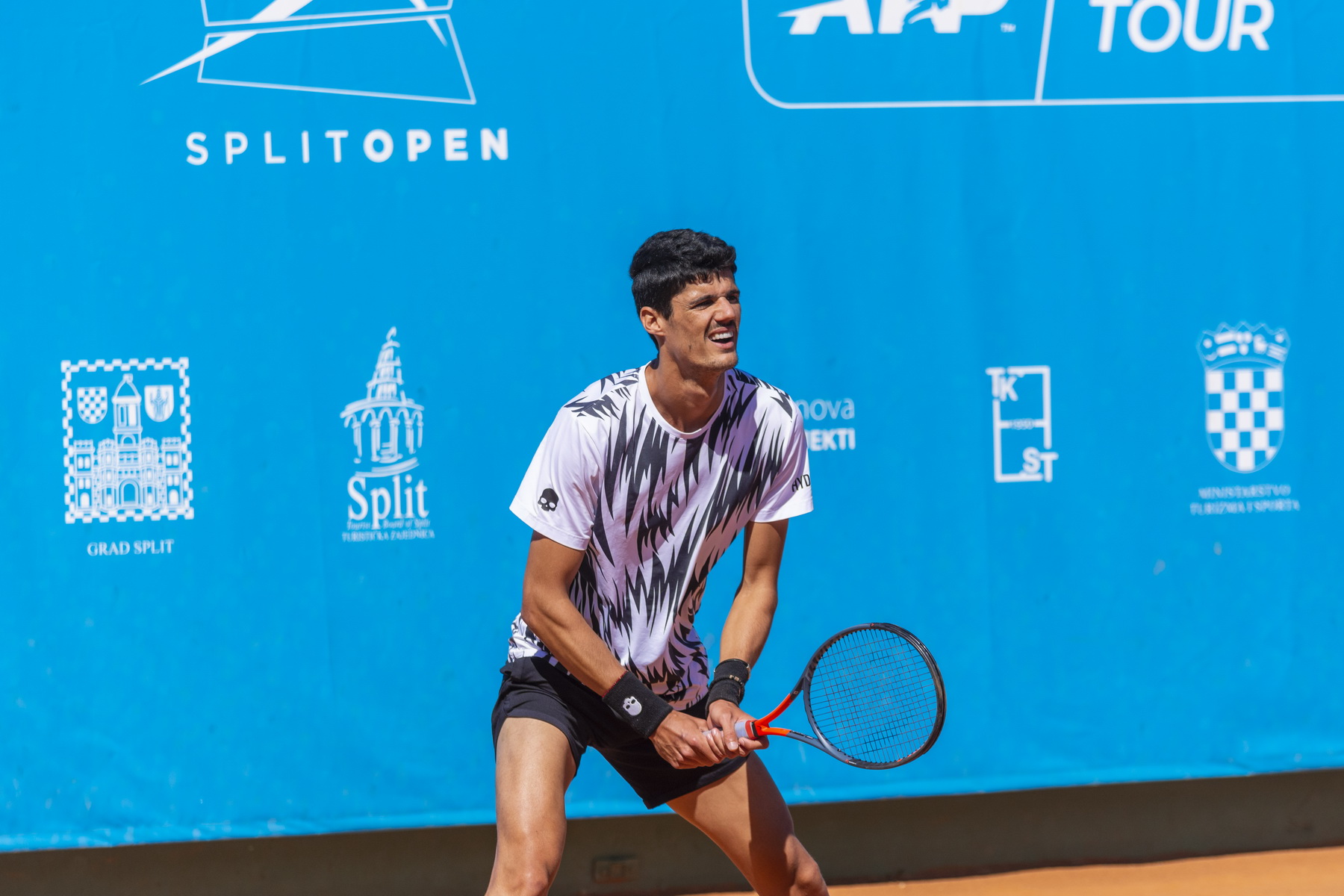
Robert Pleško
ATP CHALLENGER SPLIT OPEN, Round 1
Vukić (Aus) - Poljičak (Hrv, WC) 6:1, 6:1
Petrović (Srb, 5) - Rosol (Češ) 6:1, 6:3
Collarini (Arg) - Ofner (Aut, 3) 6:4, 6:4
Marterer (Nje) - Domingues (Por) 7:5, 6:3
E. Ymer (Šve) - Muller (Fra) 6:0, 6:4
Coppejans (Bel, 7) - Tomić (Aus) 6:2, 4:6, 6:3
Rola (Slo, 6) - Popko (Kaz) 6:3, 6:4
Round 2 Qualifications
Kavčič (Slo, 1) - Martineau (Fra) 3:6, 6:3, 6:1
Ignatik (Bje, 7) - Wu (Tpe, 2) 7:6 (1), 6:3
Santillan (Aus, 3) - Zekić (Srb) 2:6, 6:3, 6:4
Bašić (BiH, 5) - Klein (Svk, 4) 6:2, 6:4
April 6, 2021
Central Court (from 10:30)
Ajduković (Hrv, WC) - Brown (Nje, PR)
Haase (Niz) - Polmans (Aus, 2)
Sousa (Por, 1) - Žuk (Polj)
Golubev/Nedovjesov (Kaz, 1) - Krolo/Mikrut (Hrv, WC)
Court 3 (from 10:30)
Bolt (Aus) - Ignatik (Bje, Q)
Bašić (BiH, Q) - Ilkel (Tur)
Clarke (VB) - Serdarušić (Hrv, WC)
Raja/Weissborn (Ind/Aut, 4) - Kekez/Poljičak (Hrv, WC)
Court 4 (from 10:30)
Safwat (Egi, 4) - Kavčič (Slo, Q)
Kokkinakis (Aus, PR) - Horansky (Svk, 8)
Santillan (Aus, Q) - Kolar (Češ, SE)
Petrović/Safwat (Srb/Egi) - I. Sabanov/M. Sabanov (Hrv)
To follow the latest sports news in Croatia, follow TCN's dedicated page.
To learn more about sport in Croatia, CLICK HERE.
Marko Rubelj Croatian Project Underway as Luxury Zagreb Building Emerges
April the 6th, 2021 - The very first Marko Rubelj Croatian project is located close to the very heart of the City of Zagreb. The building will be one of the most luxurious and resistant buildings in the entire country.
As Poslovni Dnevnik/Suzana Varosanec writes, prestigious property in unique locations in the market context has never been endangered, and a new example in which this is confirmed once again is the luxury new building in Zagreb, the very first Marko Rubelj Croatian project. In addition to being the fruit of the labour of this entrepreneur, it is also a family project of the Luxe residence investor.
Back at the beginning of the building's construction, some of the apartments was snapped up, and obviously many famous names, successful people from the business world and some famous athletes will end up staying at that new Zagreb address.
Above European regulations
As an electrical engineer from Zagreb's FER, entreprener Marko Rubelj has been in the real estate business by vocation for twenty years now over in the United States, where he also received his master's degree from the University of Florida.
He is the author of a book about the investment side of this business, which was otherwise a 2016 bestseller on Amazon. Today, Rubelj employs 40 people in California, but now he is active with his first Croatian project, transferring the (very different) American mindset here to Croatia, which seems to be reflected in every detail of the luxury new building - Building M, which is coming more and more to life in Kukuljeviceva street.
The glass walls of the first Marko Rubelj Croatian project that connect the interior with the park open up, which raises Croatian standards, the staircase is very large, done in American dimensions, and the same goes for the building's lifts as well.
Axor pipes are planned, made by the renowned French industrial architect and designer Philippe Starck, who, for example, designed the super yacht Venus, co-founded by Apple Steve Jobs, whose value stands at a whopping 105 million euros.
In addition to this top Zagreb location and sense of luxury, the building is also characterised by its top security. At the request of the Marko Rubelj Croatian project's investors, it is designed to withstand a 20 percent higher seismic load than what is prescribed by applicable European seismic standards for residential buildings in the area of its construction.
This has been ''signed'' by the famous statician Berislav Medic, who has stated that this building has seismic resistance, which is provided by regulations for buildings of great importance (such as schools, halls for large gatherings, etc.), which significantly exceeds the earthquake standard of the vast majority of modern residential buildings.
"This is currently the most seismically residential building in the entire country," Marko Rubelj said. Construction began back in October 2020 and will be completed in October 2022, but two floors with five apartments out of a total of 22 the building will boast will remain within the family ownership of the investor.
The Zagreb-based company Prosperitas is the contractor, and the consulting company taking care of the supervision is Stimar d.o.o. which has seen hundreds of thousands of square metres of business and residential buildings throughout Croatia come to realisation.
The value of the investment is around 12 million euros, but although the building isn't yet visible because earthworks are underway, more than 30 percent of the apartments have been sold so far. Regarding cooperation with real estate agencies across Croatia, Lux residences have chosen several of them.
For more, follow our business section.
Mass Zagreb Coronavirus Vaccination Begins on Wednesday
April the 6th, 2021 - As was previously announced before the Easter holidays, mass Zagreb coronavirus vaccination is set to begin at the Zagreb Fair (Zagrebacki Velesajam) on Wednesday.
As the fight against the spread of the novel coronavirus continues across the globe, the City of Zagreb is attempting to step up its game and vaccinate as many of its residents as possible against SARS-CoV-2 this week.
As Index writes, as the mass Zagreb coronavirus vaccination process is set to get underway on Wednesday, as many as 1,500 of the capital's citizens are expected to be vaccinated on that very day. National Civil Protection staff members will take care of maintaining public order and helping the elderly out when they come to be vaccinated.
Assistant Director of the Institute of Public Health Cecilija Rotim told HTV that Pavilion 6 is ready. She explained what the vaccination would look like:
"Every person will get an appointment for when they need to come here to receive their vaccination, so I'd like to ask my fellow citizens not to come earlier than their appointment time states, but literally five minutes before their appointment, so as not to create extra crowds.
Vaccination is going to be provided for everyone on the list who has previously confirmed their arrival at the site. They'll first go to the doctor at the triage point where they will undertake a short interview, the doctor will look at the individual's medical history and look into any possible contraindications to that particular person being vaccinated.
After that, the individual will go to the nurse to receive their vaccination against the novel coronavirus.The next stage will be when the person goes to see our administrative staff where they will receive confirmation that they have been vaccinated. After that, the person will undergo observation that lasts fifteen to about thirty minutes,'' Rotim explained.
For more on coronavirus in Croatia, including travel and border rules, as well as testing centre locations across the country, make sure to bookmark this page.
Adriatic Story - The Croatian Marine Life Memory Game for Kids
April the 6th, 2021 - Adriatic Story (Croatian: Jadranska prica) is a memory game for kids containing the name of every marine orgamism living in the Adriatic sea! This 100% Croatian-made product is designed to get the youngest in our society better acquainted with what lives below the surface.
As Morski writes, two Croatian agronomists, Marina and Filip, are both self-proclaimed lovers of the sea and what lives within it. One year ago, they became parents and then they started thinking about how to educate their little girl, as well as all the other children about the most famous inhabitants of the Adriatic sea. They soon came up with an interesting idea - to open a craft that produces an educational Croatian memory game for kids - Adriatic Story.
''Marina learned through scientific-teaching work that Croats eat too little fish, and Filip is a man from the sea, who spent his whole life by the sea and with fish (he also lived part of his life in Norway, where he worked at the Institute for Marine Research). Three years ago we started a blog together with the aim of promoting fish consumption. We regularly prepared dishes from fish and from other sorts of seafood, we also educated our companions as to just why it's very important to eat fish,'' say the parents of little Nika, who they wanted to educate about the most famous inhabitants of the Adriatic sea.
This is how the idea for the Adriatic Story memory game was initially born. The game consists of 24 cards, ie 12 pairs containing inhabitants of the Adriatic sea. The illustrations for the Adriatic Story memory game were done by Croatian illustrators Tena Letica and Ivan Dilberovic. In order not to be just an ordinary memory game for kids, the box also contains a brochure with a description of each individual marine organism so that children can also learn interesting facts about each creature.
One special and highly personal addition to this Croatian game is a personalised card, on which the name of the child, the owner of the Adriatic Story memory game, can be written. The game is intended for children aged three and up, but is interesting and educational for both older children and even for adults.
As a child grows up, memory takes on a new dimension, and before the age of three it is mainly stimulated by pictorial memory, at the age of three, children mostly learn to connect in pairs, and later on they can learn many interesting things about organisms living in the Adriatic and connect them to seafood dishes consumed at home, at school or elsewhere.
Adriatic Story's entire production cycle (from the production of the game's illustrations, the preparation for printing, the printing and packaging) have all taken place right here at home in Croatia.
For more, follow Made in Croatia.
Croatian Cromaris to Continue Investments in Gazenica Until 2023
April the 6th, 2021 - The Croatian Cromaris is set to continue investing in its plant located at Gazenica (Zadar) until the year 2023, regardless of the unfavourable economic circumstances caused by the ongoing pandemic.
As Morski writes, one whole year has passed since the decision of the Zadar City Council to make other changes to the Urban Development Plan, which, way back in 2000, was aptly called the "UPU Ferry Terminal".
Apart from the remarks which could be heard back during the public debate from the Local Arbanasi Board, the changes to the Urban Development Plan, which were allegedly made to be more harmonised with the latest changes to the Spatial Plan of the City of Zadar, were adopted by the City Council last week, also without discussion, according to a report from 057.info.
Other changes to the plan, made by D&Z, were requested by the Croatian Cromaris, whose plant lies within the scope of the same plan. Cromaris was purchased from the Adris group by the former Tankerkomerc Seafood Centre way back in 2012, designed by Ante Uglescic, an architect from Zadar. About thirty or so years ago, it was a production facility that was supposed to house a fish market, valued as an example of exemplary architecture within that area.
Cromaris is still a Zadar-based company that requested and paid for changes to the UPU, due to changes in construction conditions in a predominantly industrial zone - a height of up to sixteen metres and a minimum building plot area covering 1000 square metres in total. The answer to a journalist's question of ''why'' came through the spokesperson from the Adris headquarters.
''The project of expanding production facilities in Gazenica is crucial for the further growth and development of Cromaris because it will enable the improvement of technological processes and the expansion of our portfolio of value-added products, which are the basis of diversity in relation to the competition. After many years of preparations, the recent amendment of the Urban Development Plan of the Gazenica zone enabled the harmonisation of the project and the obtaining a building permit, as well as the beginning of preparatory works for the first phase. The design of the other two phases is underway, and the completion of the entire project is expected in 2023,'' reads the information that 057.info received in regard to the Croatian Cromaris.
The plan to expand their plant in Gazenica was announced back in pre-pandemic 2019, when it was said that "the development centre was preparing new products that will meet the growing demands of the fish delicatessen market and increase the profitability of Cromaris' processing."
For more, follow our business section.
Electronic Media Agency: Publishers Received HRK 147 Million from 2016 to 2019
ZAGREB, 5 April, 2021 - The Agency for Electronic Media (AEM) has released an analysis of the use of the Fund for the Promotion of Electronic Media Pluralism and Diversity from 2016 to 2019, from which a total of HRK 147 million was allocated to publishers.
In the analysed period, radio broadcasters received the most, HRK 69.5 million, while television broadcasters got HRK 65.5 million. Electronic publications (web portals) received about HRK 6.5 million, and non-profit audiovisual producers about HRK 6.1 million, the AEM said.
Broken down by type of publisher, the average annual subsidy for the 2016-2019 period was HRK 132,817 per radio broadcaster, HRK 819,924 per television broadcaster, HRK 72,392 per electronic publication and HRK 117,235 per non-profit audiovisual producer.
Analysing the Fund's subsidies as a percentage of publishers' revenue in 2019, 46.6% of radio broadcasters received subsidies amounting to 10% to 19% of their revenue, and 35% of radio broadcasters received subsidies in the amount of 20% to 40% of their revenue and more.
Also, 45% of television broadcasters received subsidies amounting to 19% of their revenue, and another 45% received subsidies between 20% and 39% of their revenue, which indicates that television broadcasters depend more than radio broadcasters on the fund's subsidies to produce non-commercial programme content.
Most funding for public information service, culture and children
Overall, over 86% of publishers said they were satisfied or generally satisfied with the Fund, 9.74% were neither satisfied nor dissatisfied and 3.9% were generally dissatisfied. No one was very dissatisfied with the Fund.
An analysis of all eight public tenders launched by the Fund in that period shows that of the HRK 147,895,684 distributed, as much as 51.47% was allocated to three of the Fund's 16 programme categories.
Public information received 31.92% or about HRK 47.2 million, culture and heritage 11.01% or about 16.2 million, and children and young people 8.54% or more than HRK 12.6 million.
The next five categories: gender equality, upbringing and education, national minorities, cultural events and health promotion received 28.95% of subsidies or over HRK 42.8 million.
The remaining eight categories: Croatian dialects, art development, people with disabilities, environmental protection, Homeland War, media literacy and gender issues received 19.58% or slightly more than HRK 28.9 million.
"The analysis of the social impact of the Fund for the Promotion of Pluralism and Diversity for the 2016-2019 period has shown that the Fund's existence is more than justified," the AEM said.
(€1 = HRK 7.569509)
To read more news about Croatia, follow TCN's dedicated page.
ATP Challenger Split Open: Croatian Mili Poljičak Falls against Aleksandar Vukić
April 5, 2021 - Mili Poljičak tried as hard as he could, but failed to make it out of the Split Open's first round.
The 16-year-old tennis player from Split, who received an invitation from the organizers instead of the injured Borna Goja, met Aleksandar Vukić on Monday who made it very tough to win. It was 6:1, 6:1 in 51 minutes of play.
Even with good knowledge of the Firule terrain, it couldn't help Mili, as the Australian tennis player with Montenegrin and Bosnian roots was simply too strong. Mili tried many things, on one occasion even a serve under his arm, but nothing worked in the long run against the twenty-four-year-old Sydney-born player and the 207th tennis player on the ATP list.
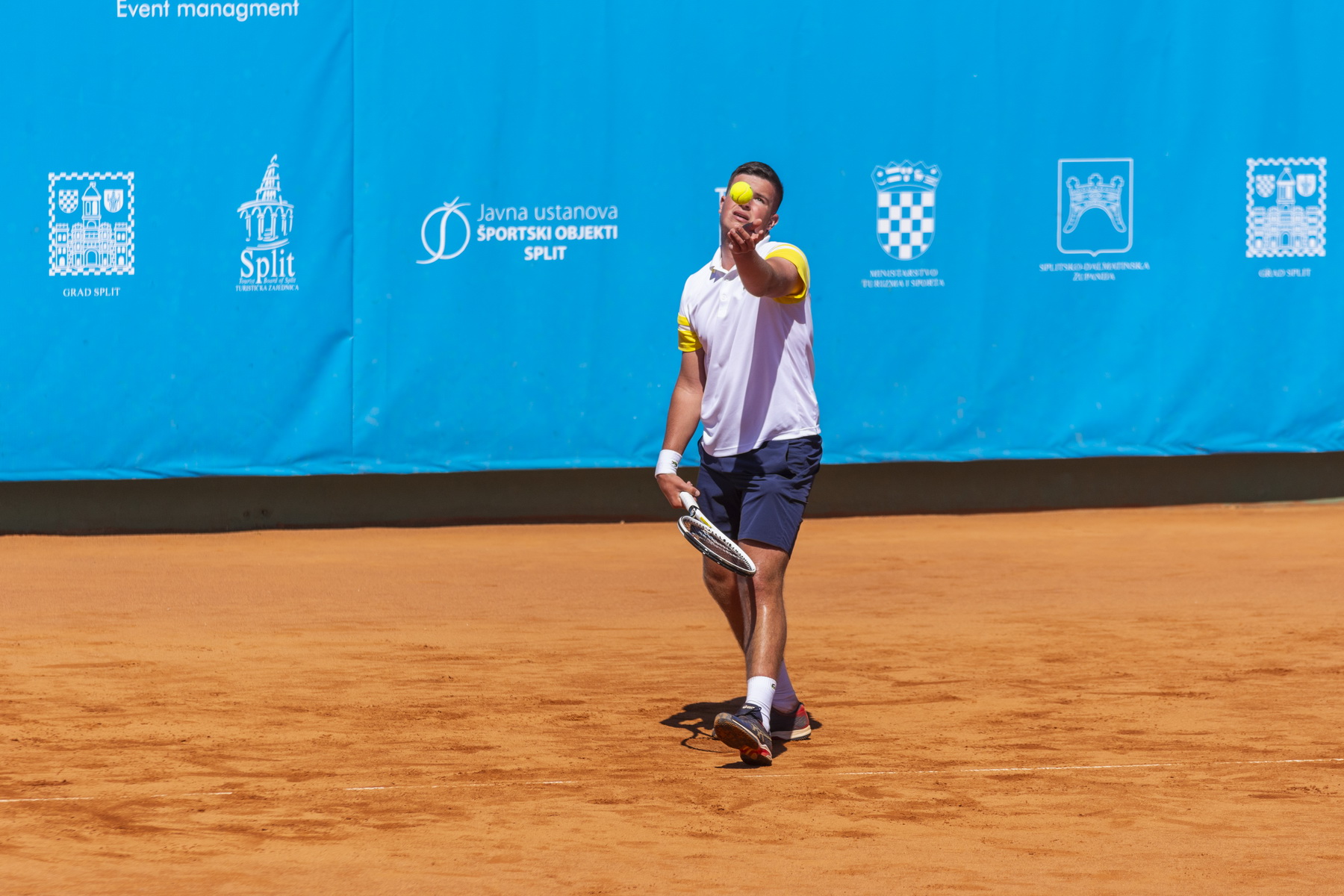
Robert Pleško
"I expected more, but it didn't work out. He was a lot better than me, and I wasn’t at my best. For me, this is only the fourth senior tournament; here the guys are more prepared, better, and faster and it is difficult to switch from junior tennis. If I had used some opportunities at the beginning of the match, it might have been different, but Vukić set himself up well and I had no chance," commented Poljičak after the match, who reached his first professional victory in ITF tournaments in Rovinj last month. Now, he's made his debut in the Challengers in Split and, despite a convincing defeat, gained valuable experience to continue his career.
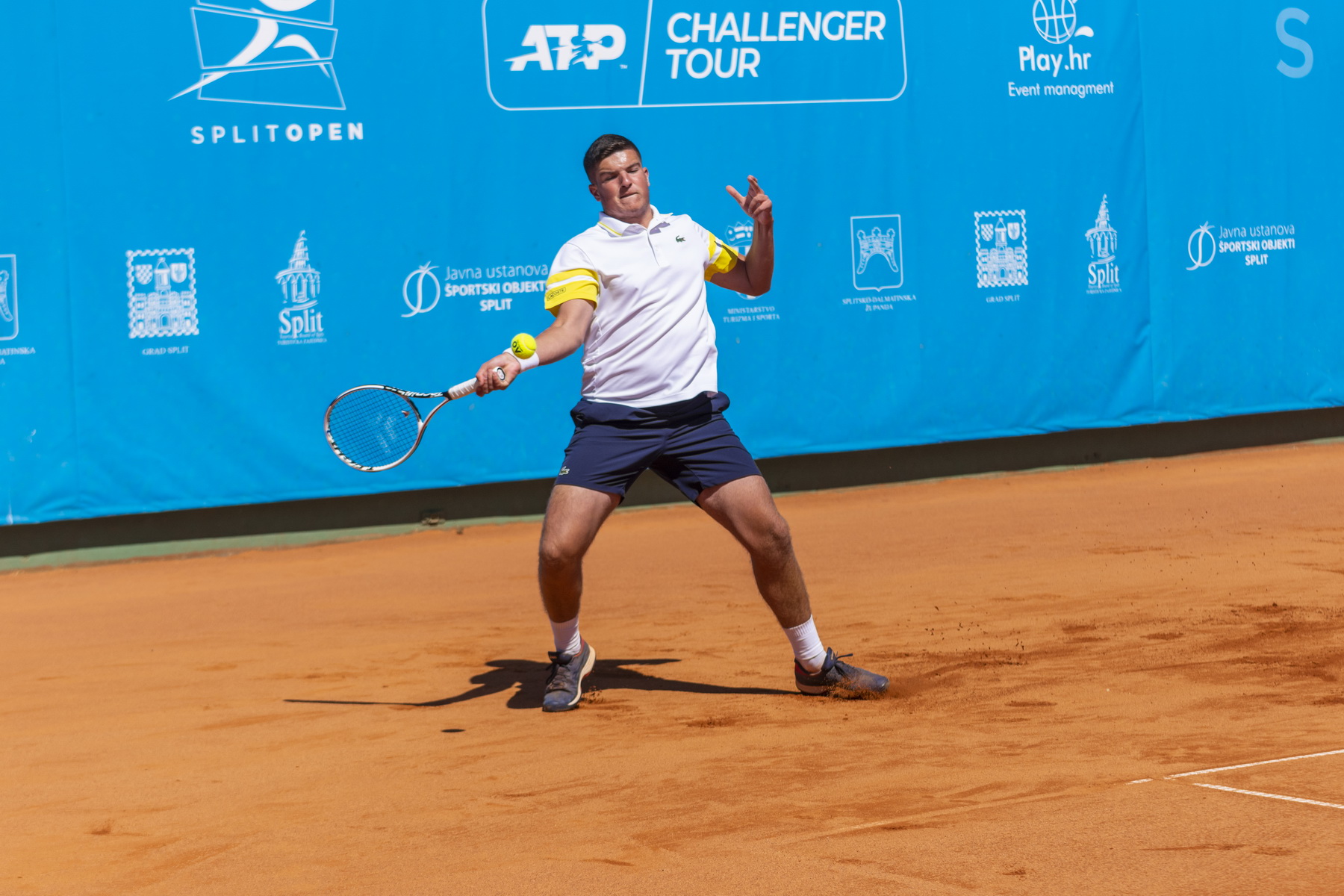
Robert Pleško
Poljičak is also competing in the doubles competition of the Split Open, where he and partner Duja Kekez will play against fourth seed Raja and Weissborn in the first round.
"After these doubles, the plan is to play the next Challenger in Split, then Futures in Šibenik, some junior tournaments, and then junior Roland Garros," concluded Poljičak.
Winner Vukić praised the young Croatian tennis player.
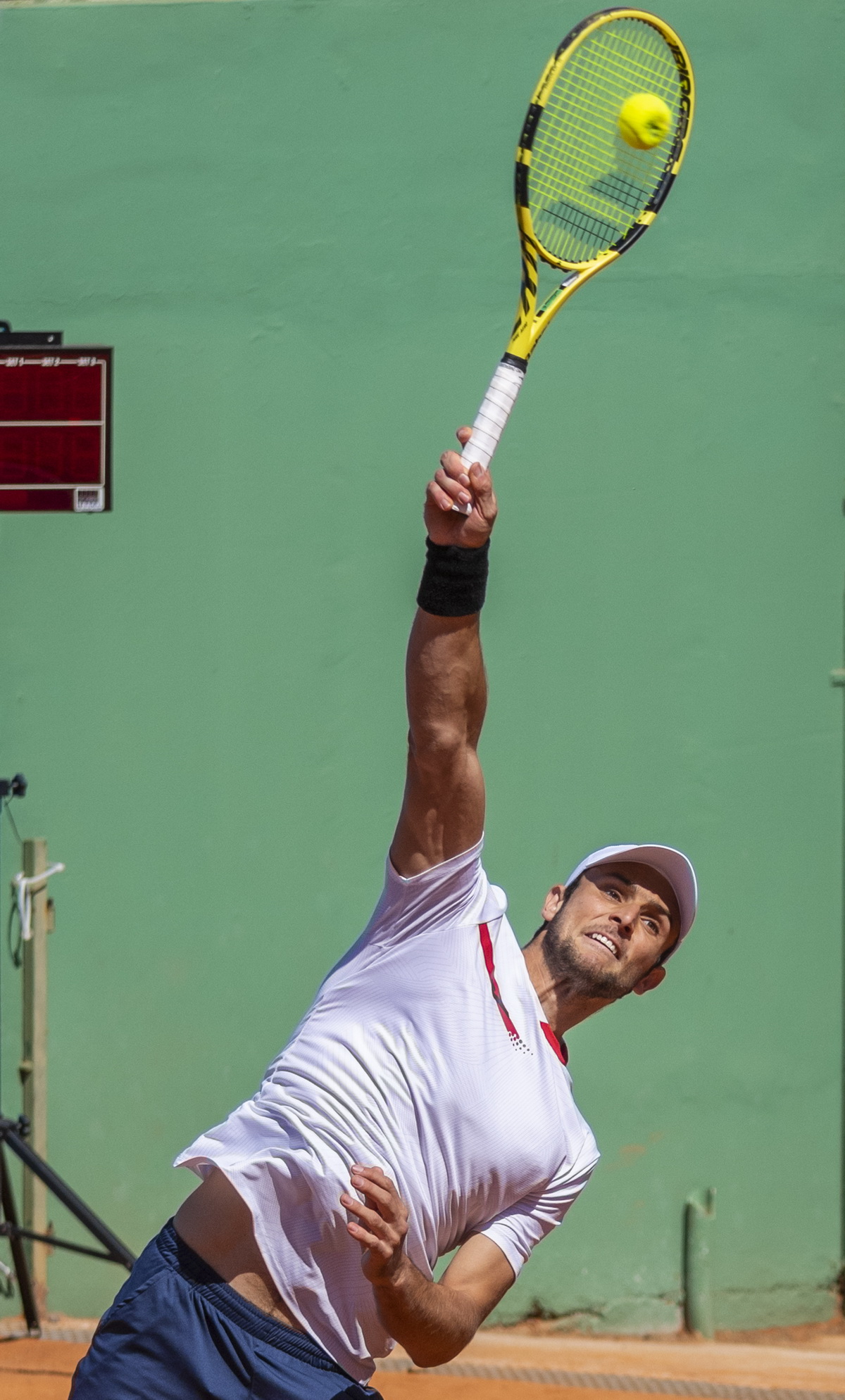
Robert Pleško
"He is young and has potential, it can be seen immediately. I was already in Croatia, in Bol at the ITF tournament and it was really nice. So that is why I am here now in Split. The hotel and food are great, the tennis center in Firule too. Everything is great."
To follow the latest sports news in Croatia, follow TCN's dedicated page.
To learn more about sport in Croatia, CLICK HERE.


